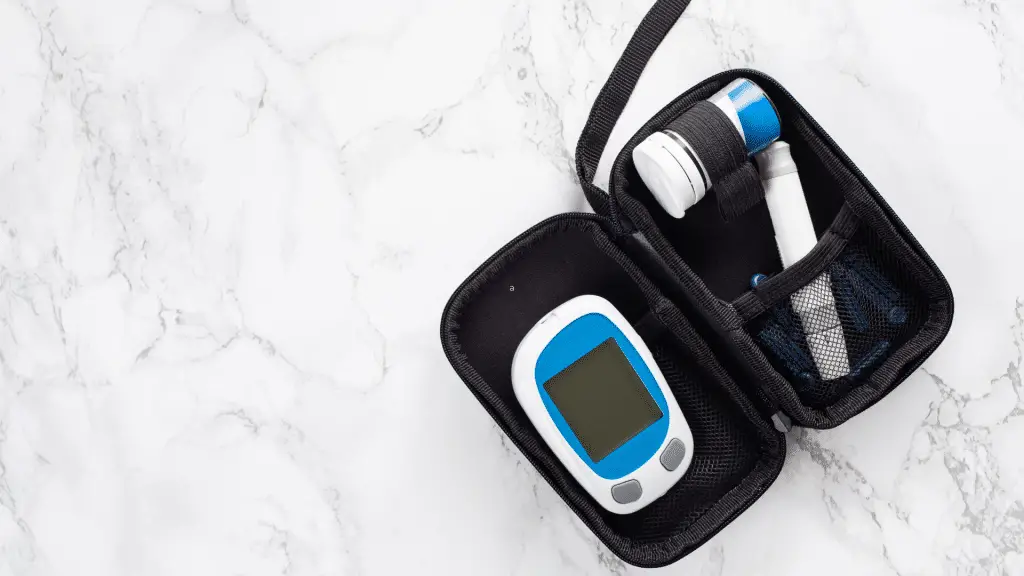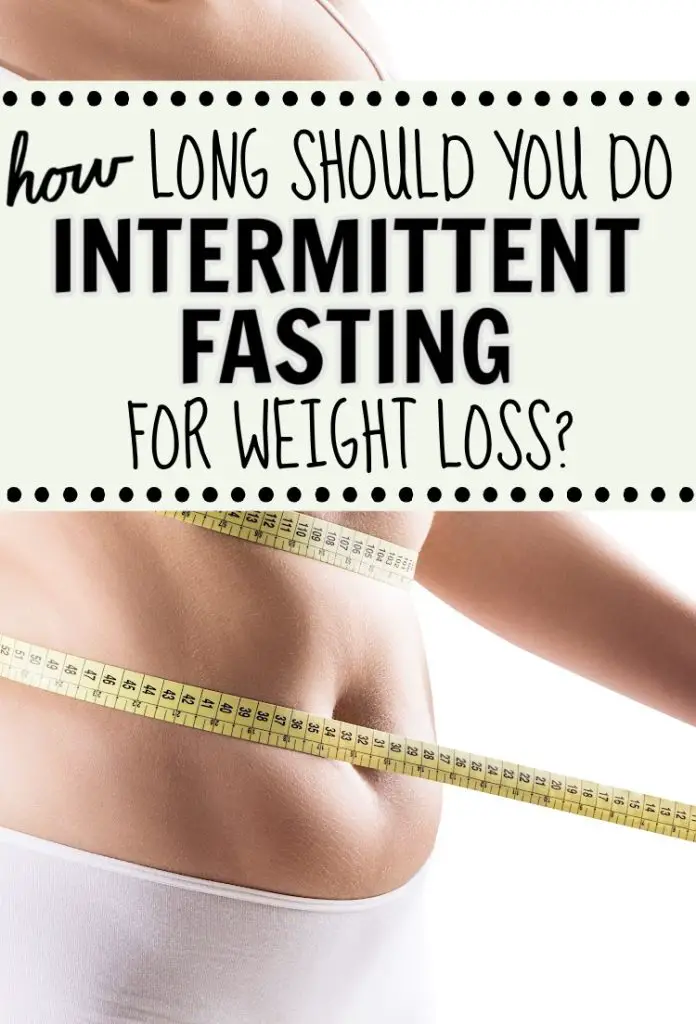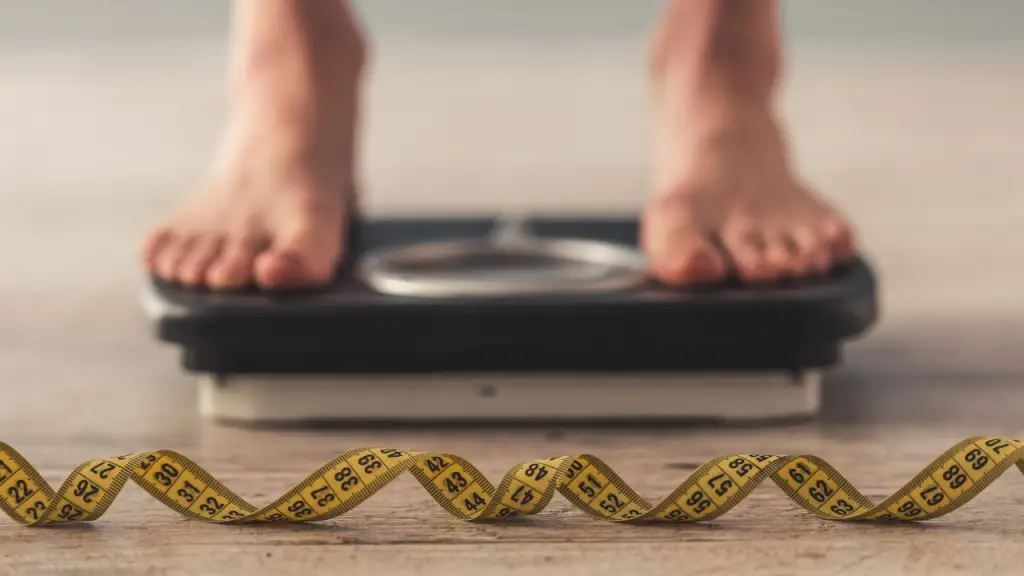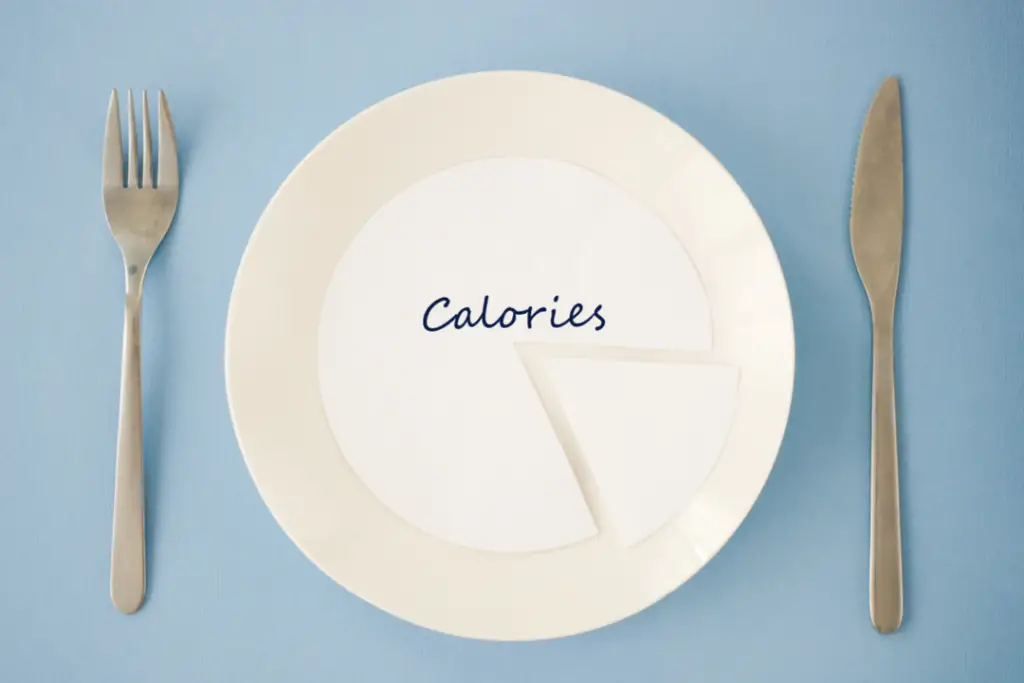You will often hear that losing weight with intermittent fasting boils down to consuming fewer calories. That’s true! However, there are a few more layers to how intermittent fasting works for weight loss, and as you discover what they are, you will be able to figure out how long you should do intermittent fasting for weight loss. Because as you know, I don’t believe that there are black-and-white answers to health and weight loss; instead, there are guiding principles that empower you to find your answers.

How Long Should You Do Intermittent Fasting for Weight Loss: Guiding Principles
First, I assume that anyone wondering how long to do intermittent fasting for weight loss is wondering how many hours a day. To figure that out, we must dive into two questions: How long does it take your body to switch to fat-burning? and How quickly do you want to lose weight?
If you are wondering how long in terms of how many months of intermittent fasting it will take to reach your goal, we will address that a little, but keep in mind that intermittent fasting will need to become a lifestyle. You will have to keep practicing intermittent fasting forever to avoid regaining the weight you lost.
How Long Does It Take Your Body to Switch to Fat Burning
The most important factor in achieving weight loss success through intermittent fasting is enabling your body to become metabolically flexible. Yes, cutting your eating window is likely to reduce the number of calories you consume, but becoming metabolically flexible is truly what will empower you to discover what it truly means to be hungry and avoid eating when you are not hungry (even during your eating window).
What It Means to Become Metabolically Flexible
Becoming metabolically flexible is simply thriving on both glucose and ketones for energy. Most of us run on glucose for energy all the time. As you gain experience with intermittent fasting, you will learn to distinguish the difference in how you feel whenever your body uses ketones for energy. When you understand that, you discover the true power of intermittent fasting, and you can determine how long you should do intermittent fasting for weight loss.
Glucose for Energy
With the standard advice of eating small frequent meals, we teach our bodies to produce insulin constantly. With a constant supply of glucose in the form of grains, tubers, fruits, starches, and veggies, your body produces insulin to transport glucose into your cells for energy or storage for later use.
Ketones for Energy
Whenever your body runs out of readily available glucose, it uses glycogen (stored glucose). When you sleep (and don’t eat for 10-16 hours), your glycogen stores get low and your body starts using stored fat to produce ketones. This switch improves your brain function and protects your neurons.
The ability to switch from glucose to ketones regularly is what metabolic flexibility is all about.

How to Use Your Ketone Level to Decide How Long to Fast
I found that I, as well as my clients, tend to see a low-level witch on a ketone monitor (at a 0.5 mmol/L) after fasting for about 12 hours. However, to use intermittent fasting for weight loss, you need a deeper ketosis. In fact, most health experts would recommend anywhere between 1.5 to 3.0 mmol/L for optimal weight loss. I have experienced great success with 1.0 mmol/L. The key is reaching a ketosis level where you can feel “the switch.” When you feel the switch, you notice an increase in energy and focus as well as a decrease in appetite.
Once you feel the switch, ensure that you fast long enough to stay there for 2-3 hours. Simple, right?
My post Experiencing a Weight Loss Stall With Intermittent Fasting? Read This! has more tips to troubleshoot an intermittent fasting window.
Measuring Your Ketones
If you are serious about figuring out how long you should do intermittent fasting for weight loss, I recommend you invest in purchasing a ketone monitor. This will enable you to measure your ketone level accurately. The Keto Mojo is an excellent option. Get a 15 percent discount with my affiliate link.

How Many Days a Week Will You Do Intermittent Fasting
As you define your intermittent fasting approach for weight loss, you need to determine how long to fast each day and how many days a week you are going to fast. As a rule of thumb, the longer you fast, the less frequently you should fast. If you fast too long too frequently, you risk stressing your body too much. You probably have heard stories of women who wrecked their hormones using intermittent fasting. I think that rather than blaming intermittent fasting, we should blame over-fasting.
Yes, fasting is a stress on your body. So is carb restriction, so is calorie restriction, and so is exercise. Fasting too frequently for too long also reduces the calories you provide your body. Pick your stresses wisely. Give yourself grace; don’t punish yourself. Your weight loss journey is your own. Do it out of love for your body, not out of hate. That will also help you pick your weight loss goal with more care.

How Quickly Do You Want to Lose Weight
When you determine how long you should do intermittent fasting for weight loss, aside from making sure you fast long enough to experience the metabolic switchover that occurs when your body runs on ketones for energy, your weight loss goal will also come into play.
Picking a Realistic Weight Loss Goal
As I mentioned, you must pick your stresses wisely to maintain your hormonal health. Moreover, when it comes to weight loss, slow and steady usually wins the race. Slower weight loss is more sustainable. Did you know that to lose only one pound a week, you need a calorie deficit of 500-1,000 calories daily? That represents 25-50 percent of what many of us are used to consuming daily. It is huge! I think that’s why many women think that they can’t lose weight because their “metabolism is broken.” They underestimate what it takes to lose weight. They are under the impression that losing 5-10 lbs a month is a realistic goal and should happen fairly effortlessly once they clean up their diet or follow a specific plan. I don’t blame them since many clickbait articles make that exact claim.
However, the truth is, if you have 20 lbs or less to lose, a realistic weight loss goal is 1-2 lbs a month. This type of weight loss will help you avoid over fasting. If you fast long enough to stay in optimal weight loss ketosis for a few hours, you most likely will need to fast for around 20 hours on your fasting days. By setting a weight loss expectation of 2 lbs a month, you can fast only 4-5 days a week and reduce the amount of stress you impose on your body.
Would you like some more guidance on reaching your weight loss goal using intermittent fasting? I created a digital program to help you do just that. It’s my 30-Day Intermittent Fasting Transformation. Don’t forget to check it out!

How Long Should You Do Intermittent Fasting for Weight Loss Video
In Summary
Defining how long you should do intermittent fasting for weight ensures you achieve optimal weight loss ketosis while avoiding stressing your body too much. It can be a bit of a balancing act, so mindfulness is essential. As you listen to pay attention to your body’s cues, you learn to act out of love for your body instead of punishing yourself because you want to look a certain way. That is the true beauty of intermittent fasting! It empowers you to discover your hunger cues and enjoy food freedom!




